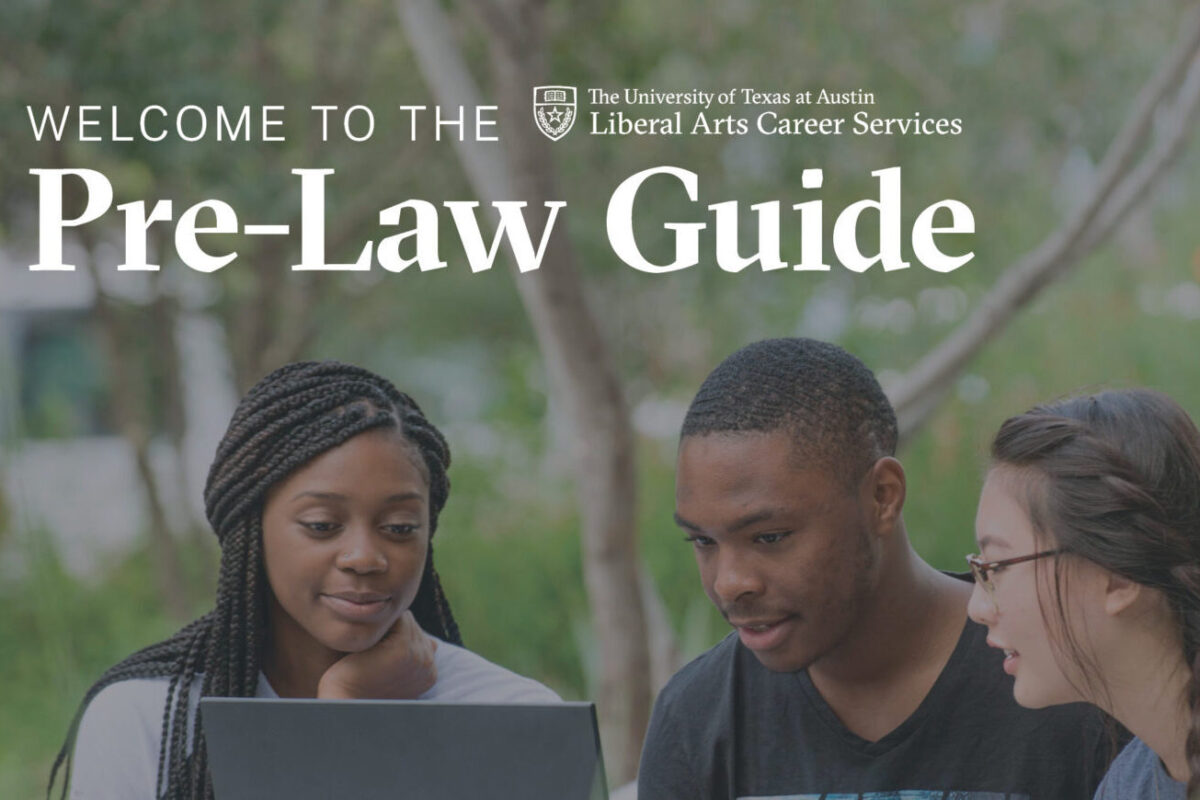For students planning a career in law, UT Austin is a natural choice for undergrad: The university sends more students to law school than almost any other. But UT’s prominence in the pre-law sphere doesn’t make the law school admissions process any less arduous or expensive. In the College of Liberal Arts, pre-law career advisor Karintha Fenley works to ease the long, complicated admissions process by offering guidance to hundreds of pre-law students and recent alumni a year, but the sheer number of would-be law school applicants sometimes overwhelms her schedule.
“Every once in a while, I will meet with students who say how difficult it was to be able to meet with me because I’m only one full-time person,” she said. “2,500 folks, students and alumni, are on my pre-law mailing list. There’s no way I could meet with all of them.”
Fenley’s encounters with students who struggled to make it onto her busy schedule sparked an idea: What if she could build a Canvas site to guide students through the law school admissions process?
“I found myself in appointments repeating the same resources over and over again,” she said. “I thought, ‘If I had a Canvas site with modules and videos, that would make my life so much easier.’”
The thought lingered for a couple of years until this past summer, when Fenley hired Dom Battles for an internship through the Texas LEAD program. Battles is a senior government and philosophy major with minors in religious studies and Core Texts and Ideas at the College of Liberal Arts who is currently applying to law schools herself.
“Working with Dom over the summer, I realized we could really expand this Canvas site concept into a whole holistic, comprehensive overview,” said Fenley. “The idea behind it was to reach as many people as possible.”
Fenley and Battles spent the summer bringing this vision to life. Battles worked 20 hours a week through her internship program, many of which were spent going through the modules Fenley was putting together and offering her perspective as a student going through the application process.
“This was probably by far the worst summer to try to book an appointment with me because I had several blocks on my calendar for this Canvas site,” said Fenley. “It took quite a bit of time, but I also looked at it as time well spent because when students start asking me questions that I’ve answered for them in my videos, I’m going to love having a resource to be able to point them to.”
The modules include 15-to-30-minute videos created by Fenley that delve into the stages of the pre-law process and feature content for all ranges of interest and involvement, from students who are considering law school to people already applying.
“The Canvas page covers everything from preparing for the LSAT, which is a really big part of the pre-law process, all the way down to figuring out your application timeline and working on your application materials to what do you do after you’ve already applied and you’re in that waiting stage,” said Battles. “There’s a lot of material that went on the Canvas course.”
The site offers a free alternative to costly third-party options, like consulting services, that only add to the mountain of expenses students face throughout the pre-law process, including fees for applications, LSAT attempts, and prep courses. Battles said they prioritized being transparent about how expensive the process can be while also pointing students towards free resources and guides.
For students that are low-income, the Canvas site provides both resources and reassurance. Fenley said that students who work to support themselves often aren’t aware that they should list it on their applications and made sure to mention in her module videos that law schools value all experience. She also added a page at the end of the site for students that are underrepresented or in unique circumstances.
“I really tried to capture, ‘Are you somebody who is maybe a non-traditional military vet? Are you somebody who is dealing with, for example, being undocumented? There are really wonderful pre-law resources for students in those situations,’” she said. “I think connecting those dots and providing resources for students who might not fit a very traditional mold of what a pre-law student or law school applicant might look like is really important.”
The pre-law Canvas site hasn’t been up and running for very long, but Fenley has already noticed a difference in her advising appointments. Though she doesn’t expect all her students to look at the Canvas site before meetings, the ones who do tend to have appointments that are more personalized and productive.
“They are asking me questions that are not answered in the Canvas site, that are specific to them and their admissions process, that are very unique,” she said. “Those are the kinds of questions I like hearing, even if they’re complicated.”
As for Battles, she said she appreciates that the site is free and accessible to all and hopes it can help put students’ minds at ease. She’s still going through the law school application process — and has a message for students in a similar position.
“Definitely don’t rush yourself through this process or think that you need to be in a certain place by a certain time, because your process is completely subjective and up to you,” she said. “Just be patient with yourself and give yourself grace always.”


